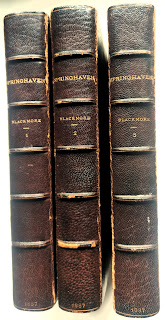Sampson Low, Marston, Searle & Rivington first edition - 1887
This is the second Blackmore novel I have read recently, but the first in the three-decker first edition. The author chose as the period for his new novel the time when Napoleon, in his scheme for reorganising Europe under French hegemony, planned to invade and conquer England. For two years a huge force waited along the coast for an invasion order that never arrived. The project was finally shattered with the English victory at Trafalgar. Whilst the lives of the great country-houses went on as happily as before, the danger existed and the threat loomed large in the lives of those who lived along the southern and eastern shores of England. Blackmore focused his interest upon a small community in Sussex, close to Hastings. 'Springhaven' is Newhaven, then a quiet fishing village and according to Blackmore's Lord Nelson, "the place of all places in England for the French to land". The novel begins: In the days when England trusted mainly to the vigour and valour of one man, against a world of enemies, no part of her coast was in greater peril than the fair vale of Springhaven...
The villain of the book, Caryl Carne, son of an English father and a French mother, is entirely credible. A man with a burning desire to seek revenge on a country who has seemingly destroyed his inheritance, leaving only a semi-destroyed castle above Springhaven, and few of the acres once belonging to his family. He it is who is to prepare the Springhaven area and beyond to receive the French invaders and who stocks up the cellars of his castle with weaponry and gunpowder for such a day. The spell that Carne casts over the mercurial Dolly Darling, is fully understandable in the light of the psychological make-up of the man and the girl. Another life-like character is the (inevitable?) parson in the novel, the Rev. Joshua Twemlow, no prig, no pedant, and no popinjay, but a sensible, upright honourable man, whose chief defect was a quick temper...he did not pretend to be a learned man, any more than he made any other pretence which he could not justify. But he loved a bit of Latin, whenever he could find anybody to share it with him, and even in lack of intelligent partners he indulged sometimes in that utterance. He admitted, I am not a man of the world, but a man of the Word.
Blackmore paints a measured picture of Nelson, who comes down to Springhaven on more than one occasion: For although he was not in uniform, and bore no sword, his dress was conspicuous, as he liked to have it, and his looks and deeds kept suit with it...his face was light and quickness. Softness also, and a melancholy gift of dreaminess and reflection, enlarged and impressed the effect of a gaze and a smile which have conquered history.
The book abounds with flashes of humour, of loving and detailed descriptions of the countryside and a plentiful cast of genuine characters. There are the Darlings, led by old Admiral Darling at Springhaven Hall, who has two daughters - Faith and Horatia Dorothy (Dolly) Darling, Nelson's godchild, who could not be happy without a little bit of excitement...she was always longing for something sweet, and thrilling, and romantic. Well she finds the latter two in Carne, but certainly not the aforementioned. There is Zebedee Tugwell, Springhaven's 'chief' - every community of common sense demands to have somebody over it, and nobody could have felt ashamed to be under Captain Tugwell. Here he is on his dandy-rigged smack, the Rosalie: his mighty legs were spread at ease, his shoulders solid against a cask, his breast (like an elephant's back in width and bearing a bright blue crown tattooed) shone out of the scarlet woolsey, whose plaits were filled with the golden shower of a curly beard, untouched with grey...the forehead was heavy, and the nose thick-set, the lower jaw backed up the resolution of the other, and the wide apart eyes of a bright steel blue, were as steady as a brace of pole-stars. No wonder fair Dolly thought him a wonderful man. Napoleon stood no chance.
Other characters, such as Mr Cheeseman, who gets into a tangle with Carne and ends up trying to hang himself; Dan Tugwell, who leaves home in high dudgeon due to his father's beating and helps the French for a while, and Harry Shanks; Mr Swipes, the Darlings' obstreperous and conniving gardener; Blyth Scudamore, a shy Classical tutor but brave naval officer when needed and who is dazzled by the Darling girls, especially Miss Dolly; all these, and others, help to create a fast-moving and well-told plot. Carne dies in his own conflagration at his family castle; Admiral Darling dies, killed by Carne; Admiral Nelson dies on Victory; and it is to the latter that the novel ends its final thoughts: his seat shall be at the Lord's right hand, and his memory shall abide for ever; because he loved his Country. The company rose, laid hand on heart, and deeply bowing said - "Amen!"
John Sutherland, in his The Longman Companion to Victorian Fiction (1988), suggests the novel expresses Blackmore's distaste for modern liberal values and his desire for a return to the ways of old, pre-industrial England.


No comments:
Post a Comment